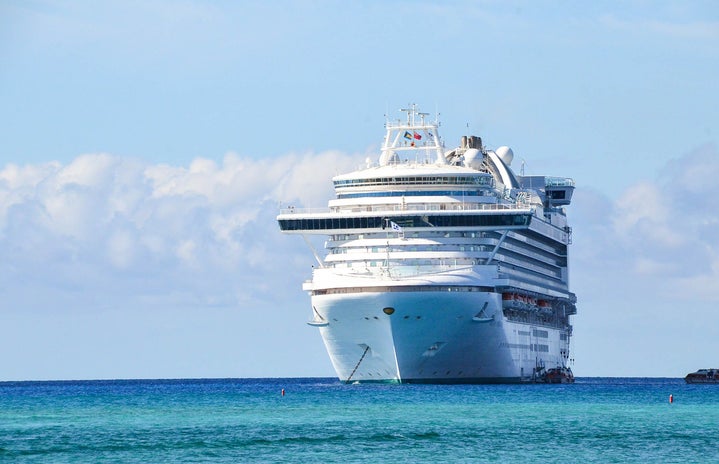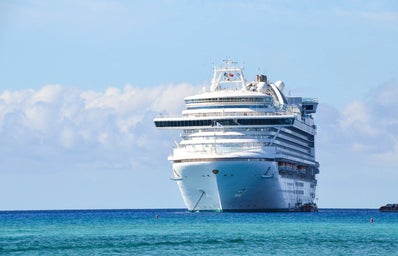*Spoilers below*
A generous notion of satire meets our screens in the Triangle of Sadness, the Swedish director Ruben Ostlund’s newest film. In three incongruent acts, the film follows the slippery reversal of a capitalist society, beginning with a sour dinner date and ending with a simplified yet twisted adaptation of Lord of the Flies, only with Donald Trump as Piggy.
The film as a whole draws incredible parallels to Parasite as classism is criticized with the immoral intent that seems inherent in all of us, at least according to these films. Poking at the common humor point of “eat the rich,” Ostlund wins his second Palme d’Or for this wild commentary on social hierarchy.
The film begins with the model-celebrity couple, Carl (Harris Dickinson) and Yaya (the late Charlbi Dean), bickering over who is covering the dinner bill. Carl is offended by Yaya’s gendered assumption that he’ll pay, and the argument follows them to the car and up the elevator.
Carl confesses to the bothered ears of Yaya that he wants them to be equal — somehow he makes himself into a victim of feminism — while Yaya seems to only care for the aspects of (so-called) feminism that benefit her and ensure the enslavement of chivalry. Both partners fumble with each other’s irrevocable hypocrisy to the consistent laugh track of the live audience.
After the brief prologue to Carl and Yaya’s jaded relationship, act two swerves the setting from land to water or a glamorous in-between: a yacht cruise.
The couple joins the bejeweled guests of elitist society, and the absurdity of capitalism’s dutiful victors shines like in Rolex the sun. Between the obnoxious noise of Yaya’s conceited Instagram photoshoots — doesn’t she know how to turn her ringer off? — there is Dimitry, a Russian oligarch rambling how he sells “shit” (fertilizer) for capital, a white-haired couple whose profitable creation is none other than the hand grenade and a woman, handicapped by a stroke, who can only repeat the words “In Den Wolken” which translates to “in the clouds.” Her three-word redundancy alludes to the abormal gap between the cruise-goers and reality.
Of course, the only choice for a captain would be a Marxist drunk, played ferociously by Woody Harrelson. Reaching the precipice of disaster, the guests are invited to a Captain’s dinner on a nauseating night of rocky waters. The captain is served a hamburger and fries, claiming to dislike fine dining, as the cruise guests choke down the unreasonable concoctions that seem to please the eye better than the mouth.
The night is quickly spoiled as the yacht hugs the waves, and the guests hug their stomachs. Bodily fluids coat every corridor and tablecloth, quite graphically, the vomiting sequence proved to be a highlight to the roaring audience.
While the contents of champagne and the captain’s dinner are spewing out both ends of almost every guest, the captain and Dimitry bond over drunkenly quoting their philosophical and political ideologies while simultaneously abusing the P.A. system to echo their (super credible) views (from the clouds) of society. How symbolic!
The final and third part of the film lands a selected group of guests, including Dimitry, Carl, Yaya and the yacht’s toilet manager, Abigail, among a few others on a deserted island. Surprise! The hierarchy is inverted as Abigail is the only one in touch with survival tactics such as building a fire and fishing. She establishes her tyrannical power, and Ostlund capitalizes on the idea that none of us are better than each other when granted power over a few. Abigail parallels the drunken habits of the Captain, but when threatened with the return of capitalist reality, her malicious intentions are revealed in an ambiguous ending.
The third act is largely unraveled compared to the climactic and fiery acts one and two. Carl and Yaya’s traction in the plot slips in the second two acts, as the film takes more interest in themes rather than characters. The not-so-surprising hierarchy reversal on the island is foreshadowed by how perfectly the elites are set up to fail.
Regardless of the end’s predictability, Ostlund’s direction is sharply metaphoric and effectively unsubtle. The absurdity of classism and capitalism is regurgitated (literally) and the projected sentiment flashing behind the fashion show in one of the opening scenes, “we are all equal,” proves to be a blaring emblem for “we are all as greedy, jealous, narcissistic as we think each other are,” by the end of the film.


